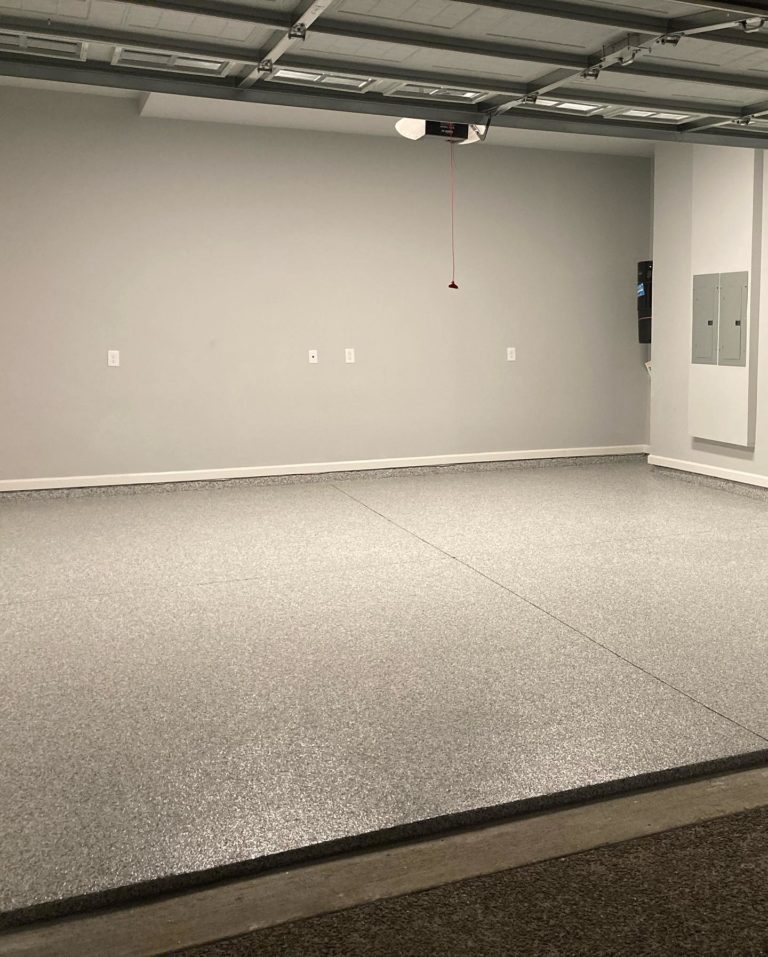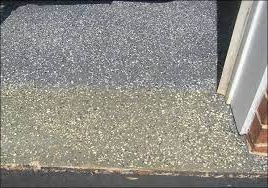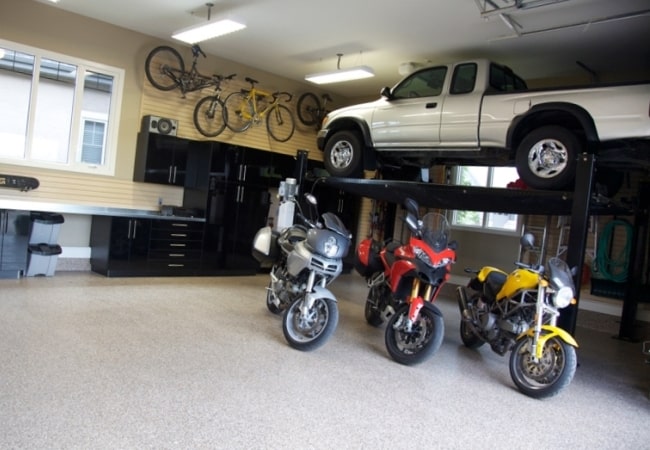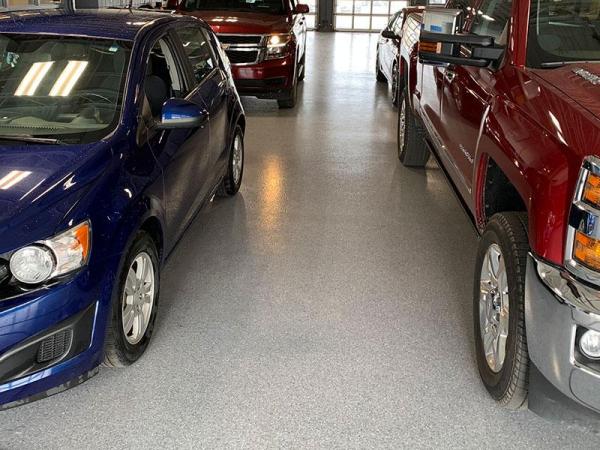Epoxy Garage Floor Coatings
Make Your Dream Garage A Reality

Epoxy Garage Floor Coating
Epoxy garage floor coatings can be great for indoor applications. Under certain conditions, they can also be used for garage floor coatings. Epoxy floor coatings are smooth, durable, and able to withstand heavy loads. They also come in a wide variety of different looks, ranging from marble to metallic to solid to chip flake.
Epoxy garage floor coatings share some characteristics with polyaspartic floor coatings, such as aesthetic appeal and ease of cleaning, though polyaspartic floor coatings are more flexible and longer lasting.
What You Need to Know About Epoxy
Epoxy is a type of resin, which then can harden and form polymer, something which sets it apart from other flooring materials. Since epoxy can be durable, many people assume that this makes it a stellar choice for garage floor coatings, since it is assumed that epoxy won’t crack easily. Epoxy can be quite durable, due to how the process of applying epoxy to concrete results in extreme hardening of the resin within it, making for a strengthened floor.
While it is acceptable to use epoxy for indoor surfaces, it’s not a good option for exterior concrete surfaces, due to the fact that epoxy is not UV resistant. This leads to the colors of your floor changing, the tans going yellow and the grays going green. If your garage has windows or you like to leave it open, epoxy is not the best choice for your garage floor coating.
People turn to epoxy garage floor coatings because they hear it is easy and cheap. The reality is that epoxy requires a more intensive installation process, with it taking anywhere from 5 to 8 days to complete the process, while other floor coatings can be done within the day. Epoxy comes with strong odors and VOC’s, meaning that you will need to protect yourself from the fumes while it cures.
Epoxy garage floor coatings are also vulnerable to causing “hot tire pickup”, which is when your tires heat up from high temperatures or from driving. Epoxy is smooth, but it can also be slick. While epoxy can be durable, it’s not the best option for garages and other high traffic areas. It’s more prone to scratching, chipping, and other damages, and needs to be redone every 5-8 years, depending on how well you care for it.
The Advantages of Epoxy Garage Flooring
Epoxy garage floor coatings can be done, given the right conditions, and there are several advantages to epoxy floor coatings.
- Epoxy rarely cracks from regular traffic.
- It is very customizable, coming in a wide array of colors and patterns.
- It’s glossy, making it so that it’s easier to see in your garage, with how it reflects light.
- They’re smooth and easy to clean.
- Professional installation can ensure reliable protection from dirt and cracking.
- You can superimpose it on other floors, rather than needing to remove the existing floor before applying.
The Disdvantages of Epoxy Garage Flooring
Epoxy garage floor coatings are cautioned against for good reason, though. You should be aware of the disadvantages of epoxy floors and know how they compare to other flooring options so that you can make the best decision for you and your garage.
- Epoxy can be slippery, increasing risk of accidents and injury.
- Its durability depends on the installer – if applied by someone less experienced, it can wear out faster.
- It requires replacement as soon as you notice signs it’s beginning to wear out.
- It’s difficult to replace without damaging the floor.
- It takes a long time to apply, and the curing process can easily be complicated.
- It’s not UV resistant.
- It gives off strong odors and VOC’s.
- It’s more expensive in the long run.
- It scratches easily.
- There’s hot tire pickup.

Why We Recommend Polyaspartic Floor Coatings
Polyaspartic flooring has all the benefits of epoxy garage floor coatings, and then some. While both polyaspartic and epoxy floors are durable and beautiful, polyaspartic can withstand the weather and chemicals without getting slippery like epoxy does. Polyaspartic floor coatings are elastic, making them better for garage floor coatings, since they can adjust to temperature changes, lessening the risk of cracking.
Polyaspartic coatings are UV resistant, so you can rest assured that your beautiful floors won’t change colors from sun exposure. They’re resistant to damages, and are much quicker to apply. Polyaspartic coatings can be done within one day, and without strong odors, making it so that you can use your garage sooner rather than later.
While polyaspartic floor coatings are more expensive upfront than epoxy coatings, in the long run, you spend less, since they don’t need to be redone every 5-8 years. Polyaspartic coatings can be used both indoors and outdoors, and can withstand high impact.
To learn more about polyaspartic floor coatings and their effectiveness versus epoxy garage floor coatings, please contact our certified installers at My Garage Floor Guys.
Epoxy Garage Floor Coatings FAQ
Epoxy garage floor coating is a durable and protective layer made from epoxy resin and hardeners that is applied to garage floors. It provides a strong and attractive surface that can withstand heavy use.
Epoxy coatings offer benefits such as increased durability, resistance to stains and chemicals, easy maintenance, improved aesthetics, and enhanced light reflection.
Epoxy coatings work well on concrete and cement-based floors. However, floors with moisture issues may require special attention before application.
With proper care and maintenance, epoxy coatings can last anywhere from 5 to 10 years or more. This is why we prefer a polyaspartic coating, they last a lot longer!
Yes, epoxy coatings come in various colors and finishes. You can also add decorative elements like colored flakes or metallic pigments to achieve a personalized look.
The application process typically takes a few days, including preparation, coating application, and curing time. This is why we use a polyaspartic coating with quicker curing times. A typical garage is completed in 1 dy.
Most epoxy coatings require at least 24 to 72 hours of curing time before light foot traffic. Heavy objects and vehicles should be kept off for about a week. Another reason we prefer a polyaspartic coating, plan on 24-36 hours before parking in garage.
Yes, epoxy coatings are known for their resistance to chemicals, oils, and stains, making them an ideal choice for garages.
Minor damages like scratches can often be repaired by applying a new coat of epoxy. Contact a professional to see what is needed.
Regular sweeping and occasional mopping with a gentle detergent are usually sufficient. Avoid harsh chemicals that could damage the epoxy finish.
Epoxy coatings can be slippery when wet. To enhance safety, consider using anti-slip additives in the topcoat or adding textured finishes.
Standard epoxy coatings might struggle with extreme temperatures, so specialized formulations may be required for climates with significant temperature variations.
In some cases, epoxy can be applied over existing coatings, but proper surface preparation is essential for adhesion.
Epoxy coatings can be removed through grinding or chemical stripping, but it can be a labor-intensive process.
Ready To Transform Your Garage?




